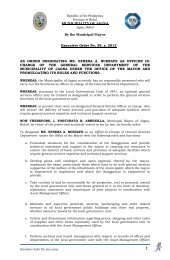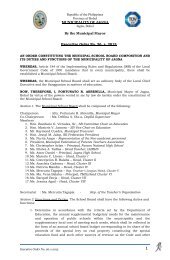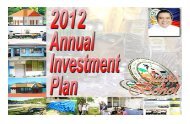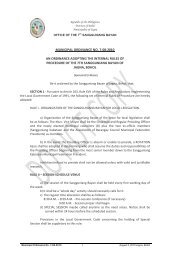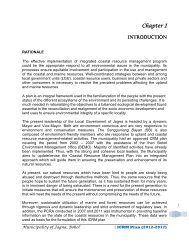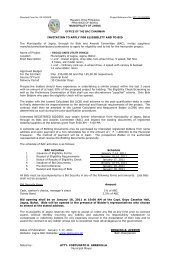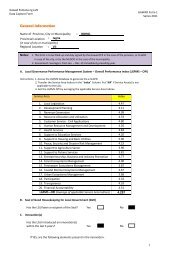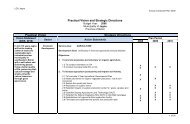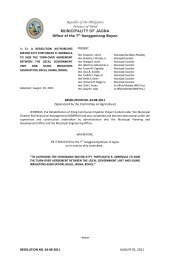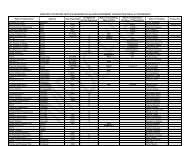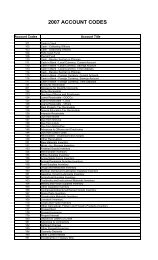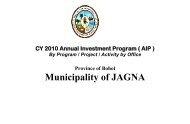Jagna Code for Children 2006
Jagna Code for Children 2006
Jagna Code for Children 2006
You also want an ePaper? Increase the reach of your titles
YUMPU automatically turns print PDFs into web optimized ePapers that Google loves.
c. Every child has the right to freedom of thought, conscience andreligion, subject to appropriate parental guidance;MUNICIPAL ORDINANCE NO. CC3-01-<strong>2006</strong> January 30, <strong>2006</strong>5 TH Sangguniang Bayan Regular Session<strong>Jagna</strong>, Bohold. Every child has the right to privacy and shall be protected againstunlawful interference with such privacy, family, home orcorrespondence, and to unlawful attacks against his or her honorand reputation.Article E. Obligation of the ChildSection 5. Responsibilities of the Child. Every child regardless of the circumstances of birth,sex, religion, social status, political antecedents and other factors shall:a) Strive to lead an upright and virtuous life in accordance with tenets of his or herelders and mentors, and the biding of a clean conscience;b) Love, respect and obey his or her parents, and cooperate with then in thestrengthening of the family;c) Exert his or her utmost to develop his potentialities <strong>for</strong> service, particularly byundergoing a <strong>for</strong>mal education suited to his or her abilities in order that he or shemay become an asset to himself <strong>for</strong> herself and to society;d) Extend to his or her brothers and sisters love, thoughtfulness and helpfulness, andendeavor with them to keep the family harmonious and united;e) Respect not only his or her elders but also the customs and traditions of his or herpeople, the memory of his or her people’s heroes, the duly constituted authorities,the laws of the country, and the principles and institutions of democracy;f) Actively participate in civic affairs and in the promotion of the general welfare,recognizing that it is the youth who eventually be called upon to discharge theresponsibility of leadership in shaping the nation’s future; andg) Help in the observance of individual human rights, the strengthening o freedomeverywhere, the fostering of cooperation among nations in the pursuit of theircommon aspiration <strong>for</strong> unity and prosperity, and the furtherance of world peace.CHAPTER 3ROLES, RIGHTS AND DUTIES OF VARIOUS SECTORSArticle F. Roles of Various SectorsSection 6. The Family. The family is the central unit responsible <strong>for</strong> the primary Socialization ofchildren which is important in the prevention of <strong>Children</strong>’s rights violations. Governmental and socialef<strong>for</strong>ts to preserve the integrity of the family including the extended family should be pursued.Section 7. The Role of Fathers. Fathers play a vital role in their children’s lives, in the nurturingand rearing of children at home. Policies and legislations shall be enacted and programs shall bedesigned and implemented <strong>for</strong> the inclusion of their critical role.Section 8. The Role of Women. Women in their various roles plays a critical role in the wellbeingof children. Ef<strong>for</strong>ts <strong>for</strong> the enhancement of women’s status and their roles in development mustbegin with girt children. The enhancement of the status of women and their equal access to education,training, reproductive health, and other extension services constitute a valuable contribution to a nations’social and economic development.Section 9. The role of Local Councils <strong>for</strong> the Welfare of <strong>Children</strong>. These Council shall inaddition to their existing duties and functions, coordinate with and assist their corresponding LGU’s in4



